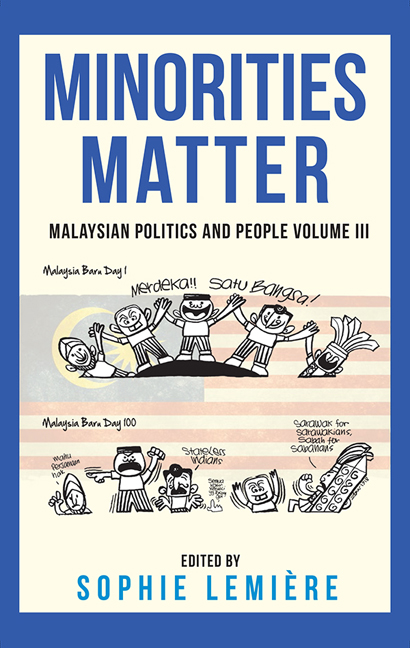Book contents
- Frontmatter
- Contents
- Acknowledgements
- Foreword
- Introduction
- Part I Engaging Politics: The Role of Minorities in GE14 and Beyond
- 1 Local Elections, Decentralisation, and Institutional Reform
- 2 ‘Where's Our #30peratus’: A Feminist Critical Discourse Analysis of Twitter Debates on Women's Political Representation
- 3 Romantic Whispers: When Relationships Mobilise Political Agency in the Sabah Elections
- 4 The Orang Asli in GE14: Towards Meaningful Political Engagement?
- 5 The 1963 Malaysia Agreement (MA63): Sabah and Sarawak and the Politics of Historical Grievances
- Part II Building Democracy: Malaysia Baru and the (Im-)possible Reform
- List of Contributors
2 - ‘Where's Our #30peratus’: A Feminist Critical Discourse Analysis of Twitter Debates on Women's Political Representation
from Part I - Engaging Politics: The Role of Minorities in GE14 and Beyond
Published online by Cambridge University Press: 25 January 2020
- Frontmatter
- Contents
- Acknowledgements
- Foreword
- Introduction
- Part I Engaging Politics: The Role of Minorities in GE14 and Beyond
- 1 Local Elections, Decentralisation, and Institutional Reform
- 2 ‘Where's Our #30peratus’: A Feminist Critical Discourse Analysis of Twitter Debates on Women's Political Representation
- 3 Romantic Whispers: When Relationships Mobilise Political Agency in the Sabah Elections
- 4 The Orang Asli in GE14: Towards Meaningful Political Engagement?
- 5 The 1963 Malaysia Agreement (MA63): Sabah and Sarawak and the Politics of Historical Grievances
- Part II Building Democracy: Malaysia Baru and the (Im-)possible Reform
- List of Contributors
Summary
This chapter draws on feminist critical discourse analysis to interrogate the ‘glass ceiling’ in Malaysian politics. Prior to GE14, women held only 10.8 per cent of parliamentary seats and 8.3 per cent of full ministerial posts. When presented with the opportunity to redress this gender gap, the winning alliance, Pakatan Harapan, failed to meet their election pledge to ensure that at least 30 per cent of policymakers are women. Presently, women constitute only 14.4 per cent and 19.2 per cent of legislators and full ministers respectively. This gender imbalance, however, did not meet much public criticism. It is this general acceptance of the status quo that is the focus of the present study. While research surrounding women's low political representation in Malaysia has focused on the structural and cultural factors that inhibit opportunities for women within their parties, this study examines tweets from the #30peratus Twitter campaign led by women's rights advocates to uncover the ideologies and discourses in the public sphere that justify hegemonic gender relations in Malaysian politics. The findings show that not only are patriarchal attitudes towards women politicians prevalent, but discourses endorsing patriarchal ideologies are often legitimised in terms of neoliberal and postfeminist discourses.
Introduction
For women in Malaysia, equal representation in elected office, particularly in positions of political power, continues to be a challenge. Even though female candidates performed better than their male peers in GE14, women hold only 32 of the 222 parliamentary seats (14.4 per cent) due to a gender gap in candidacy (Yeong, 2018). Women accounted for 10.8 per cent of candidates nominated to stand for election, despite constituting 25–50 per cent of members in major political parties (Tan, 2011). The winning alliance, Pakatan Harapan (PH), fielded 85 women out of a total of 660 candidates (Bernama, 2018), thus falling short of their electoral pledge to ensure that ‘at least 30% of policymakers are women’ (Pakatan Harapan, 2018: 140). While the new PH government appointed more women to the Cabinet than previous administrations, including the country's first woman deputy prime minister, the long-standing gender gap in Malaysia's highest decision-making body remains substantial: only 5 of the 26 ministers and 4 of the 23 deputy ministers are women. This female under-representation has not, however, generated much public criticism and it is this widespread acceptance of the status quo that is the focus of the present study.
- Type
- Chapter
- Information
- Minorities MatterMalaysian Politics and People Volume III, pp. 20 - 35Publisher: ISEAS–Yusof Ishak InstitutePrint publication year: 2019



